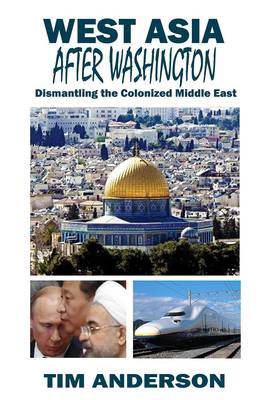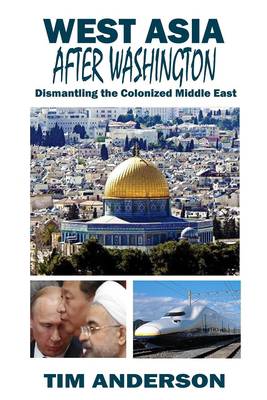
Je cadeautjes zeker op tijd in huis hebben voor de feestdagen? Kom langs in onze winkels en vind het perfecte geschenk!
- Afhalen na 1 uur in een winkel met voorraad
- Gratis thuislevering in België vanaf € 30
- Ruim aanbod met 7 miljoen producten
Je cadeautjes zeker op tijd in huis hebben voor de feestdagen? Kom langs in onze winkels en vind het perfecte geschenk!
- Afhalen na 1 uur in een winkel met voorraad
- Gratis thuislevering in België vanaf € 30
- Ruim aanbod met 7 miljoen producten
Zoeken
€ 41,45
+ 82 punten
Omschrijving
At the turn of the century Washington launched a series of invasions and proxy wars against all the independent peoples and states of the region, in the name of creating a 'New Middle East'. That offensive involved mass propaganda and the use of large proxy-terrorist armies, especially sectarian Islamist groups armed and financed by Washington and its regional allies, especially Saudi Arabia, Qatar, Turkey and Israel. Resistance to that regional war led to the formation of a loose regional bloc, led by Iran, which is now forming more substantial relations with the wider counter-hegemonic blocs led by China and Russia, in particular the BRICS and the Shanghai Cooperation Organization (SCO).
West Asia After Washington addresses how, as Washington's multiple wars for a subjugated 'New Middle East' fail, the global order is shifting against the North American giant. China is displacing the USA as the productive and economic center of the world and new global organizations are competing with those created by the Anglo-Americans. It is in this global context we must understand the future of the Arabic and Islamic countries of the Middle East, now often called West Asia in reflection of that new orientation.
Among other things, this alliance is making real what North American intelligence has long feared and termed an 'Iranian land-bridge', extending to the Mediterranean in the west and as far as China in the east. That 'land bridge' between East Asia and Europe centers on Iran, the largest independent state of the region and is, from a Zionist perspective, thought to represent "the most serious long term existential threat to Israel" because it forms a united resistance front in support of the colonized Palestinian people.
This book discusses the wars of hegemonic decline, the roots of Western fascism, Zionist cancel culture, the Kurdish card in Syria, the purging of Christians from the 'New Middle East', the betrayal of Yemen, and takes us inside Syrian Idlib. Then it looks into the near future, considering Washington's strategic retreat, the legacy of murdered Iranian Commander Qassem Soleimani, and the possibilities of dismantling Apartheid Israel and the lifting of the siege on Syria and its recovery. The Iranian land bridge to China, Iran's Resistance Economy, regional integration, and the challenge of multipolarity offer insight into the West Asian region after Washington.
West Asia After Washington addresses how, as Washington's multiple wars for a subjugated 'New Middle East' fail, the global order is shifting against the North American giant. China is displacing the USA as the productive and economic center of the world and new global organizations are competing with those created by the Anglo-Americans. It is in this global context we must understand the future of the Arabic and Islamic countries of the Middle East, now often called West Asia in reflection of that new orientation.
Among other things, this alliance is making real what North American intelligence has long feared and termed an 'Iranian land-bridge', extending to the Mediterranean in the west and as far as China in the east. That 'land bridge' between East Asia and Europe centers on Iran, the largest independent state of the region and is, from a Zionist perspective, thought to represent "the most serious long term existential threat to Israel" because it forms a united resistance front in support of the colonized Palestinian people.
This book discusses the wars of hegemonic decline, the roots of Western fascism, Zionist cancel culture, the Kurdish card in Syria, the purging of Christians from the 'New Middle East', the betrayal of Yemen, and takes us inside Syrian Idlib. Then it looks into the near future, considering Washington's strategic retreat, the legacy of murdered Iranian Commander Qassem Soleimani, and the possibilities of dismantling Apartheid Israel and the lifting of the siege on Syria and its recovery. The Iranian land bridge to China, Iran's Resistance Economy, regional integration, and the challenge of multipolarity offer insight into the West Asian region after Washington.
Specificaties
Betrokkenen
- Auteur(s):
- Uitgeverij:
Inhoud
- Aantal bladzijden:
- 289
- Taal:
- Engels
Eigenschappen
- Productcode (EAN):
- 9781949762839
- Verschijningsdatum:
- 15/09/2023
- Uitvoering:
- Paperback
- Formaat:
- Trade paperback (VS)
- Afmetingen:
- 156 mm x 229 mm
- Gewicht:
- 403 g

Alleen bij Standaard Boekhandel
+ 82 punten op je klantenkaart van Standaard Boekhandel
Beoordelingen
We publiceren alleen reviews die voldoen aan de voorwaarden voor reviews. Bekijk onze voorwaarden voor reviews.









